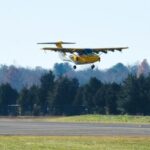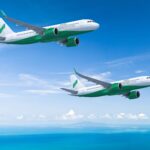Emirates president Sir Tim Clark has warned about “shortcuts” being taken in the supply chain.
The aviation industry has been suffering from wide-ranging production delays and grounded aircraft owing to reported defects affecting a number of engine and airframe types.
Speaking at Airlines 2023 in London, Sir Tim urged the manufacturing sector to “concentrate on quality”.
“They [OEMs] need to concentrate on their own supply chain, they need to concentrate on less short-termism, more looking at the way the various bits and pieces of the aircraft are actually constructed,” he said.
“No shortcuts being allowed to be taken by OEMs, or rather suppliers to the OEMs, who think they’re doing a favour both in terms of costs and speed to market.
“At the same time, during the course of the last decade, the manufacturers turned the screws on the supply chain … which of course made it very difficult. Less of that. Get us back to what it takes to get the aircraft out on time in good nick.”
Asked specifically if he thought shortcuts were being taken within the supply chain, Sir Tim replied: “If the truth be known, if you talk to the supply chain, not the manufacturers themselves, they will say yes.”
Supply chain defects
Boeing recently identified improperly drilled holes on the aft pressure bulkhead of its 737 MAX, involving supplier Spirit AeroSystems.
The planemaker also said in the summer that it had spotted an issue with a component fitted to the 787’s horizontal stabiliser, concerning a part delivered by a third-party supplier.
There have also been problems involving General Electric’s GE90 engine, which powers the Boeing 777, and ongoing problems with Pratt & Whitney’s Geared Turbofan series which powers the Airbus A320neo.
Sir Tim has also flagged concerns around the Rolls-Royce Trent XWB-97, which is the engine option for the Airbus A350-1000, which he said was the reason the carrier was not yet willing to order the stretched widebody.
Bullish future
Commenting on the near-term future after Emirates placed several large orders for Boeing and Airbus widebodies at the Dubai Airshow, Sir Tim said: “It’s a very bullish future, very optimistic future but that’s the way we are and always have been.
“This is the beginning of the third phase of our growth, which will take us to the early 2040s. It sees the retirement of the B777s and eventually the A380s, and replacement of that fleet by 777-9s, 777-8s and 350s.
“It also takes us down a path where we will expand the network probably by about another 80% over the next 10 or 15 years, multiple new points coming on in various parts of the world using the various new tools that we’ve got, principally the A350, which is the 300 seater in three classes for us, and the 777-9s, and eventually the 380s will drop out at the back end of the next decade and the beginning of the 2040s.”
Subscribe to the FINN weekly newsletter

